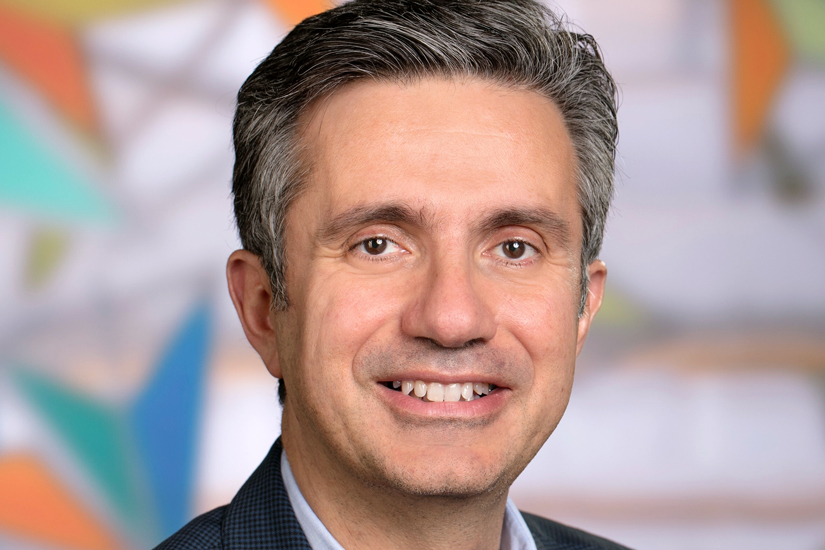Henry Hadad had an audience and a chance, if he wanted it, to address the slipping state of patent protection in the US and around the world.
As president of the Intellectual Property Owners Association, Hadad took the opportunity to rally those who seek to protect the work of innovators. “We as stewards of the system need to look beyond the interests of today for our clients and look to the long-term interests of our country,” he remembers telling the large crowd. “What should we be doing for this system?”
A member of the association told him afterward he sounded “like a patent evangelist.” And, there’s a bit of truth to that.
“I really believe in it, and I want to leave the industry in as strong a position as I can,” says Hadad, who is the senior vice president and deputy general counsel at pharmaceutical giant Bristol-Myers Squibb. “Without predictable and meaningful intellectual property, new therapies will not exist, period.” This is especially true when it comes to biopharmaceuticals.

Companies like Bristol-Myers Squibb will spend billions over decades to develop new biopharmaceutical drugs and therapies. Ensuring a reasonable period of exclusivity is critical to fund research to discover and develop the next generation of life-saving innovation medicines, Hadad says, and it’s a cycle that must be protected. “The biopharmaceutical area is the most reliant on intellectual property to maintain its innovation cycle,” Hadad says.
As innovation in the biopharmaceutical space has become more advanced, patent protection has become, in some cases, more difficult, particularly in the United States. Two things have led to a weakened environment in which US patents are more likely to be overturned: a series of unfavorable Supreme Court decisions making it more difficult to obtain and enforce patents, and a new law permitting those who want to challenge a patent to avoid court and seek serial administrative reviews by the US Patent and Trademark Office, Hadad says.
Research and development investments are a “leap of faith” that require a system that prevents others from simply taking your innovations for their own reward. “Just when US innovators should be investing in research into emerging technologies like precision medicine and artificial intelligence, we have undermined this system,” Hadad says. Beyond the threat to innovation, this encourages other countries to weaken their IP systems as well move investment and job creation overseas.
It creates an uncertain situation for many companies, both big and small, particularly those looking at significant research and development costs: should they go for ambitious but risky innovation or play it safe? Hadad says that more are playing it safe, and that threatens innovation itself.
“I want to leave the industry in as strong a position as I can. Without predictable and meaningful intellectual property, new therapies will not exist, period.”
His passion for patent and innovation protection began as an undergraduate biology major, but timing and fate steered him in a different direction. When Hadad entered law school in 1988, patent law was becoming more in vogue with the creation of the Court of Appeals for the Federal Circuit in 1982. The Hatch-Waxman Act passed a couple years later, creating a pathway for generic drug approvals and a framework for challenging pharmaceutical patents.
Law firms were beginning to staff up, and that offered an opportunity for Hadad at a time when patent law was quickly becoming an important specialty. “I loved it. I thought it was really interesting, and it seemed like there was a greater purpose,” Hadad says.
He has had to learn his fair share of advanced science to keep up, and he’s the first to admit there are others who are more steeped in the science than he is. But his team is particularly adept at identifying advancements that can and should be protected—and they are passionate about doing so.
It’s about more than one drug or one invention. For Hadad, it comes down to a society that continues to dream big and invest in trying to find true innovations. This comes into focus when Hadad considers the sweep of his life.
Hadad is the grandson of Lebanese immigrants who made their way through Ellis Island and saw a world emerge from no running water or electricity to automobiles, radio, and television. He wonders what his grandparents would have thought of the Information Age and technologies available now. “My grandfather, also named Henry, was particularly appreciative of how this country rewarded creativity and innovation,” he says, “and how it drove the advancement of our society.
“Since the beginning of this country, we’ve had a patent system that has led to the greatest innovations in history,” Hadad said. “It is our responsibility to foster this system so that future generations can create the next great advancement.”

